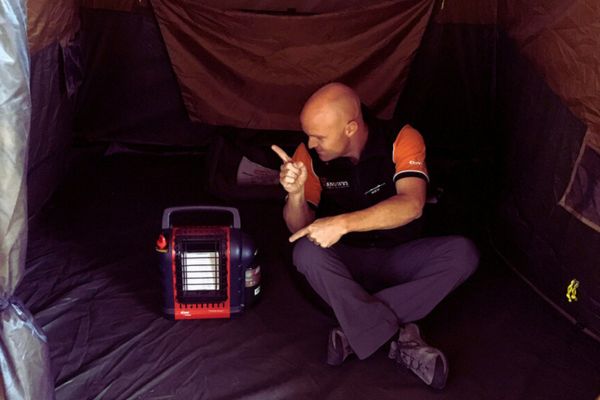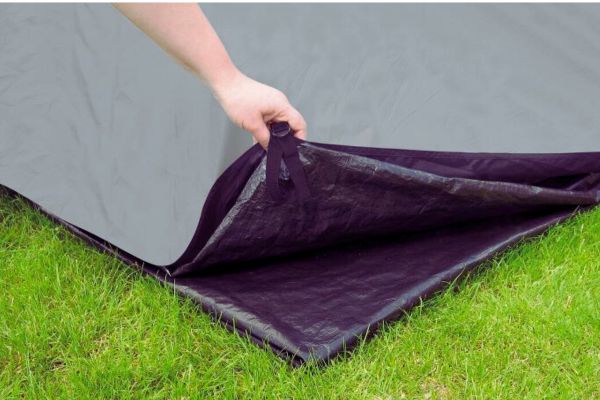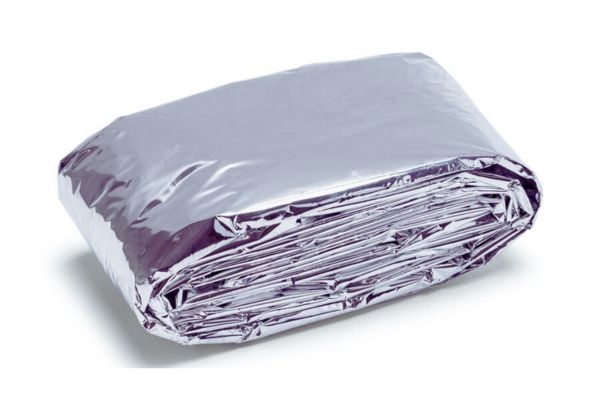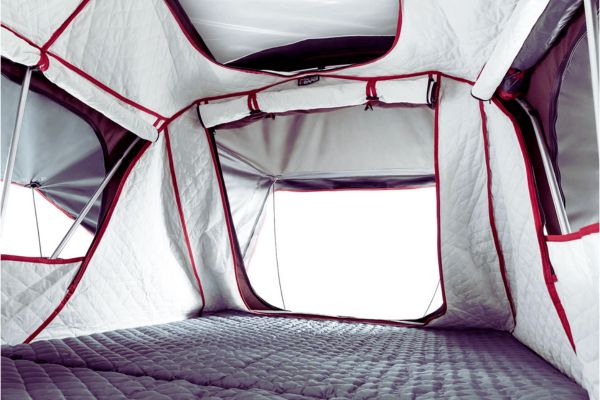Are you thinking of spending some time outdoors in the cold weather of the year? Well, there are several places which you can prefer for camping, trekking, hiking and many more adventures. Well, camping is always a joyous experience in any season. But the question here arises is how you will keep yourself warm while camping on winter nights. As we know, staying warm in cold weather while camping can be challenging sometimes, especially at night and it can be worse depending on where you are camping. So, choosing the right gear for such a camping experience is crucial. In this article, we will discuss how can you keep yourself warm while camping inside tents or how to insulate a tent for winter camping.
How does Tent Insulation Work?

Basically, tent insulation means creating a barrier that does not let the cold weather hit you and your tent while camping in any sort of manner. Or we can say, tent insulation reduces the effects of cold weather that can spoil your winter camping experience. Tent insulation helps reduce the transfer of heat from one material to another while winter camping.
A camping tent is a small enclosed space and has two major areas which we have to insulate i.e., tent walls and the floor. These two areas can be insulated with the help of various factors like thermal insulation, thermal blankets, footprints, foam padding, a tarp, and many more. Our body releases 8.37 x 106 joules of heat on average and at the time of heavy winter camping, this ratio increases. When we camp inside a tent in winter without any insulation, the heat that our body releases and cold winds from outside combine and create the conditions of moisture and dew inside the tent which is harmful. Insulation of a tent works in such a way that this situation does not occur and you can camp comfortably in a warm tent.
Best Materials To Insulate A Tent For Winter Camping
Making the right choice in selecting the right material for tent insulation is a crucial thing. This helps protect you and your camping gear i.e., camping tent or a canvas tent from harsh climatic conditions and results in an enjoyable winter camping experience. Here are some common materials used for tent insulation:
- Closed-Cell Foam Pads
- Open-Cell Foam Pads
- Thermal Blankets or Emergency Blankets
- Reflective Insulation
- Down or Synthetic Insulated Blankets
- Aluminized Space Blankets
- Insulating Fabrics
- Fiberglass or Synthetic Insulation Panels
- Mylar Insulation
- Thinsulate
Read More: How Much Firewood Do I Need For Camping
Why Insulating A Tent for Winter Camping is Important?

If you are camping in the winter season, you need to know why insulating your tent while camping is important. Your camping tents will feel cool because of the convection. Your body loses heat in the tent more than it produces which can adversely affect your body. The heat from your body and the cold in the air combine to produce moisture and dew which can lead to severe diseases. Let’s understand why insulating a tent for winter camping is important:
1. Temperature Regulation
Winter camping can involve places that have sub-zero temperatures. Insulating your tent in such areas helps in the regulation of the temperature inside the tent. It prevents excessive heat loss and helps in retaining the warmth generated inside the tent. It ultimately creates a comfortable environment even in the freezing climate.
2. Preventing Hypothermia
Insulating your tent can reduce the effect of moisture and dew inside the tent. This moisture and dew develop when your body loses heat and the cold air from outside comes inside the tent. Hypothermia is a severe disease that can be caused if you are not staying in a safe and insulated tent in while winter camping. The result of hypothermia is asthma and allergies which can be life-threatening. Proper insulation of camping tents can reduce the risk of hypothermia and maintain a warmer interior to stay inside.
3. Conserves Energy
Insulating a tent while winter camping can reduce the use of heating equipment that consumes a lot of energy and power. You can conserve your energy resources to use later on your camping at the time of any emergency by simply insulating your tent from outside as well as inside. This will keep your tent automatically warm and suitable for sleep on winter nights.
4. Comfort and Quality of Sleep
A properly insulated tent provides you with a better and more comfortable sleeping environment because quality sleep can double the experience of your winter camping. A well-insulated tent ensures that you can rest without being disturbed by the cold weather outside.
5. Gear Longevity
Camping gear should not be exposed to such extreme climates as winters. These gears also need a balanced temperature to reduce the wear and tear effect. Camping tents are also considered as camping gear which can be affected in harsh climates if not insulated properly. Insulating the tent can increase its longevity and protect it from any damage that can be caused by fluctuating climatic conditions.
6. Positive Camping Experience
Proper insulation of a tent can enhance your overall camping experience as you will not be affected by any climatic conditions, your camping gear will remain protected, and you can enjoy camping activities with more energy and focus on the beautiful winter landscapes without any discomfort or distraction from the cold.
Ways To Insulate A Tent for Winter Camping
Here are various different ways with the help of which you can insulate your tent while winter camping. You can choose or combine all these tips and techniques to insulate your camping tent efficiently to enhance your camping experience. Insulating a tent is important to reduce that dreaded feeling of waking up in a freezing cold tent. The type of insulation you use will depend on the size and shape of your tent. Let’s have a look at different ways to insulate a camping tent in winter:
1. Purchase a 4-Season Tent

If you love camping and spend most of the time of the year camping, a 4-season tent is the perfect gear for you. These tents come with extra insulation and waterproofing features to keep you warm and dry in any weather, especially in winter. You can also take waterproof boots with you if necessary. 4-season tents are made up of thicker fabrics on the inner tent body, which protects you better from the cold.
2. Choose a Smaller Tent
Generally, larger tents are less effective at protecting you from the cold because air becomes cold more often in large spaces. So try to choose small tents if you are planning a winter camping. Less space in a tent causes less airflow and keeps you warm and comfortable. Smaller tents are easy to carry and can be adjusted in your backpack.
3. Find a Good Spot to Pitch

First of all, before setting up your camping tent find a suitable spot where you can pitch your tent easily. A suitable spot for setting up a tent can be where the cold wind does not hit your tent directly. Try to pitch your tent near some trees or under any other cover that will act as a windbreaker.
4. Clear the Ground
After finding a suitable spot to camp your tent, make sure you set it up on a flat spot. If you’re camping in the snow, clear the snow from the surface first because setting up your tent on top of the snow can cause snow to melt. Sometimes, it can eventually re-freeze and can form uncomfortable bumps and ridges that can develop pain in your back by morning.
5. Get a Tent Heater

Also, remember to take a portable tent heater with you on camping. In case, you have a proper-insulated tent but you still want some more warmth inside the tent, there the tent heater helps. Tent heaters are portable and easy to carry while camping. These heaters will keep you warm whenever you need more warmth.
6. Use a Tent Footprint

If you are planning to camp on a harsh surface like sand or snow, use a tent footprint to protect the bottom of your camping tent from wear and tear. Tent footprint also helps in insulating your tent for winter camping by protecting your tent from cold and icy grounds.
7. Cover your Tent with a Tarp

Covering your tent with a Tarp is another effective way to insulate a tent for winter camping. A high-quality tarp provides extra protection against ice, snow, and rain. Covering your tent with a tarp during winter camping will also help reduce condensation inside the tent which also extends the tent’s life.
8. Use Heat Packs
Heat Packs basically provide warmth through their chemical reaction that generates heat without needing an external source such as batteries.
Here are some tips for using them:
- Place heat packs next to your body instead of directly against it.
- Be sure not to place the heat pack directly under clothing as this will trap moisture and cause discomfort or burns.
- Keep away from children at all times.
- Do not use if damaged or leaking fluids.
9. Ground Insulation

The most efficient and common way to insulate a tent is to adopt ground insulation. Closed-cell foam mattresses and sleeping pads are the forms of ground insulation. They’re easy to pack, lightweight, and provide excellent thermal insulation.
Sleeping pads are of many shapes and sizes. Before purchasing sleeping pads, consider these features:
- Lightweight sleeping pads
- Materials, such as closed-cell foam will give you more warmth
- Length, longer sleeping pads offer better insulation
- Width, narrow widths allow you to sleep diagonally.
Air mattresses may be necessary inside a self-inflating mattress pad with an open-cell foam mat over it in extreme winter conditions when snow depth exceeds. If you need extra warmth other than air mattresses you can also use an insulated sleeping bag or quilt on top of these high-quality pads.
10. Cover the Tent With Thermal Insulation

If you are choosing a tent for winter camping, try to find one that already has a thermal layer of insulation. In case you have a tent without the thermal layer, you can purchase it separately and cover the inner walls of your tent with a thermal layer of insulation afterward to keep your tent warm at the time of winter camping. It effectively traps warmth inside and reflects it inside the tent.
11. Build a Windbreak of Snow

Yes, you read it right. A windbreak of snow can help keep your tent warm. You just need to build a wall of snow to block icy and freezing winds from hitting your tent directly. Have an idea of building a snow wall as a windbreaker:
- Pack snow into blocks.
- Use them to start building the wall
- Keep building until the layers of icy bricks reach your waist. This is considered as the perfect height of the wall.
- Once you’re done, throw some snow on top for extra insulation.
12. Insulate Walls & Roofs of Tent

If you are camping in winter, try insulating the walls and the roofs of your tent from inside. This works as the best insulator and keeps you warm and comfortable inside the tent. To insulate the interior of the tent, you can use an insulating material that is specially designed to insulate the tent’s walls and roofs in such a manner that it can keep you safe while winter camping.
13. Use Foam Padding to Insulate The Floor

This is an efficient way to insulate your tent floor from the inside. Large pieces of foam can be used to cover the floor completely and can help limit the transfer of heat between your tent and the cold ground.
Conclusion
The importance of insulating a tent for winter camping should be considered whenever you plan winter camping to have an enjoyable and comfortable winter camping experience, as it directly affects safety, comfort, the lifespan of your camping gear, and most importantly the overall enjoyment of your outdoor adventure in cold weather. When you are choosing insulation materials to insulate your tent, consider the weight, packaging, insulation properties, and the specific conditions in which you need to insulate your tent. It is also crucial to ensure that the materials you have chosen for insulation are safe to use inside the tent and are not hazardous. Always remember to follow safety guidelines and manufacturer recommendations to effectively use the tent insulation.
FAQs
How do I pack and store insulated materials for winter camping?
Pack insulated materials in a way that minimizes compression, as compressed insulation loses its effectiveness. Store them in a dry place to prevent moisture buildup, which can reduce insulation performance.
Can I insulate a tent after it’s been set up?
Yes, you can add insulation to a tent even after it’s set up. Lay down insulating pads on the tent floor, hang thermal blankets on the tent walls, and make sure your sleeping gear is adequately insulated.
Can I use space blankets for tent insulation?
Space blankets (aluminized mylar) can be used to reflect and retain body heat. However, they are relatively thin and may tear easily, so use them in conjunction with other insulating materials.
Can I use a regular sleeping bag for winter camping?
While a regular sleeping bag may work in moderately cold conditions, it’s advisable to use a winter-rated sleeping bag for lower temperatures. Look for bags with lower temperature ratings and good insulation properties.
You May Also Like:

